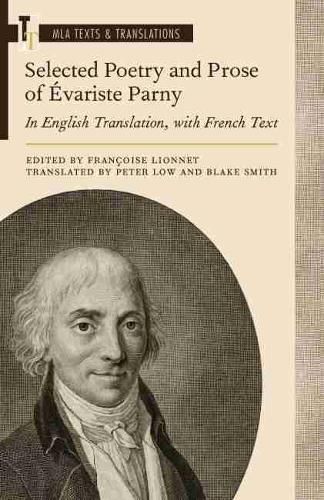Readings Newsletter
Become a Readings Member to make your shopping experience even easier.
Sign in or sign up for free!
You’re not far away from qualifying for FREE standard shipping within Australia
You’ve qualified for FREE standard shipping within Australia
The cart is loading…






Praised by Voltaire and admired by Pushkin, Evariste Parny (1753-1814) was born on the island of Reunion, which is east of Madagascar, and educated in France. His life as a soldier and government administrator allowed him to travel to Brazil, Africa, and India. Though from the periphery of France’s colonial empire, he ultimately became a member of the Academie Francaise. Despite his reaching that pinnacle of respectability, some of his poetry was banned after his death.
This edition includes poems from the Poesies erotiques and Elegies, which established Parny’s reputation; the Chansons madecasses ( Madagascar Songs ), which were influential in the development of the prose poem; five of his published letters, written in a mixture of prose and verse; the narrative poem
Le Voyage de Celine ; and selections from his sardonic, anticlerical later poetry. A substantial introduction discusses Parny’s poetry in connection with its literary context and the themes of gender, race, and postcoloniality.
$9.00 standard shipping within Australia
FREE standard shipping within Australia for orders over $100.00
Express & International shipping calculated at checkout
Praised by Voltaire and admired by Pushkin, Evariste Parny (1753-1814) was born on the island of Reunion, which is east of Madagascar, and educated in France. His life as a soldier and government administrator allowed him to travel to Brazil, Africa, and India. Though from the periphery of France’s colonial empire, he ultimately became a member of the Academie Francaise. Despite his reaching that pinnacle of respectability, some of his poetry was banned after his death.
This edition includes poems from the Poesies erotiques and Elegies, which established Parny’s reputation; the Chansons madecasses ( Madagascar Songs ), which were influential in the development of the prose poem; five of his published letters, written in a mixture of prose and verse; the narrative poem
Le Voyage de Celine ; and selections from his sardonic, anticlerical later poetry. A substantial introduction discusses Parny’s poetry in connection with its literary context and the themes of gender, race, and postcoloniality.